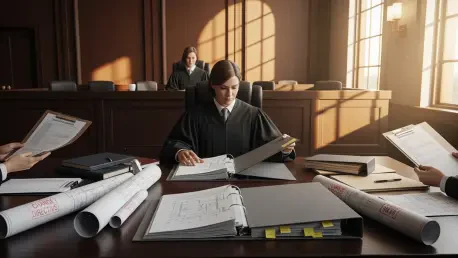High-stakes construction projects often end not with a ribbon-cutting but with a file-stamped complaint, and the dispute between Wayfair LLC and LOC Associates LLC d/b/a Generis Collective over two retail build-outs fits that pattern with a twist that highlights the fault line between contract and tort theories. A Massachusetts Superior Court judge in the Business Litigation Session pared away the gloss of broad accusations and left a lean core centered on who promised what, who performed, and who paid. This is not a story about sweeping declarations of corporate misconduct; it is a careful ruling that separates plausible contract claims from unsupported attempts to recast the quarrel as fraud, interference, or consumer deception. The decision points the litigation straight at the project documents, change directives, and payment flows that typically decide construction cases.
Procedural Posture And Case Background
Wayfair launched suit alleging that Generis failed to pay subcontractors and misused funds tied to build-outs at Edens Plaza in Wilmette, Illinois, and at the King of Prussia Mall in Pennsylvania, and Generis answered with nine counterclaims spanning contract, tort, quasi-contract, and statutory theories. On June 13, 2025, Judge Salinger, sitting in BLS2, ruled on a Rule 12(b)(6) motion to dismiss those amended counterclaims and applied the conventional plausibility rubric, with Rule 9(b) particularity layered on for fraud. The court also reconciled the shifting nomenclature around Generis’s identity, clarifying the contracting entity to prevent confusion at later stages. That housekeeping step matters in construction litigation, where corporate form and signatory authority can shape who owes whom.
The ruling framed the case as a fundamentally contractual dispute, even as it acknowledged Generis’s effort to broaden the palette with statutory and tort claims based on alleged promises and pressure. In assessing the pleadings, the court treated Generis’s factual allegations as true but demanded more than labels, conclusions, or generic grievances. The opinion emphasized that the projects’ parallel timelines and overlapping players did not collapse the claims into a single narrative; instead, each project anchored a distinct breach theory supported by separate performance and payment allegations. Against that backdrop, the judge drew sharp boundaries around claims that simply mirrored the contract counts while lacking specific facts showing deception, coercion, or third-party disruption.
The Claims That Survive—And Why Others Fell Away
Four counterclaims survived: two breach-of-contract counts, one for each site; an implied covenant of good faith and fair dealing; and unjust enrichment advanced in the alternative to the express contract theories. On the breach claims, the court found Generis alleged facts that plausibly suggested nonperformance or misperformance by Wayfair, allowing discovery to test scope, timing, and compliance. The implied covenant claim cleared the bar because Massachusetts law protects the right of each party to enjoy the benefit of its bargain, and the pleadings described conduct that could have frustrated contractual fruits. Unjust enrichment remained viable because Generis plausibly alleged extra work beyond the written scope, a common feature of dynamic build-outs.
By contrast, the court dismissed statutory and tort claims that either lacked particularized facts or attempted to elevate a straightforward contract dispute into broader misconduct without evidentiary heft. The Illinois Contractor Prompt Payment Act claim did not proceed, and the consumer protection counts under Massachusetts c. 93A and the Illinois Consumer Fraud Act fell because the alleged conduct—cost-control messages and layoffs—did not plausibly amount to coercion, extortion, or deceptive scheming aimed at Generis. The fraud claim failed Rule 9(b) because it rested on alleged false promises unsupported by facts showing contemporaneous intent not to perform, and the tortious interference claim collapsed for want of concrete allegations that any named subcontractor or supplier actually changed course because of Wayfair’s acts.
The Doctrinal Filters And What Comes Next
Two doctrinal screens shaped the outcome: plausibility under Rule 12(b)(6) and particularity for fraud under Rule 9(b), with a persistent theme marking the boundary between contract and tort or consumer claims. The court reiterated that breach alone does not morph into a tort, and that consumer statutes require conduct of a coercive, extortionate, or deceptive character not present in ordinary performance disputes. False promise theories must plead the who, what, when, where, and—critically—the why that supports a reasonable inference of no intent to perform at the time of the statement. Without those specifics, artful rhetoric yields to dismissal at the threshold.
The practical implications are immediate: discovery will train on the Edens Plaza and King of Prussia contracts, project communications, invoices, change requests, payment trails, and the parties’ handling of work allegedly outside scope. The surviving claims channel the case toward granular questions about notice, approval, and compensation for extra work, while sidelining expansive narratives about corporate culture or general cost-cutting. For industry players, the ruling reinforced disciplined pleading and robust documentation as the most reliable path forward, and signaled that attempts to repackage routine construction friction as fraud or consumer deception would face skepticism. As framed by the decision, the next steps lay in proving performance, scope, and value, not in relitigating dismissed theories.









